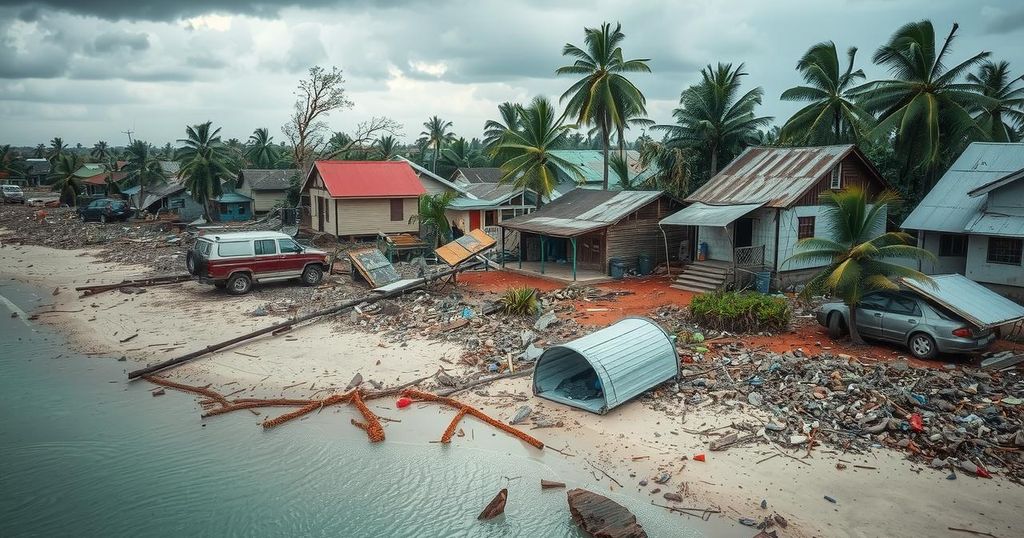Cyclone Chido has devastated northern Mozambique, displacing thousands and damaging infrastructure. UNHCR is responding with emergency relief and emphasizing disaster preparedness. Preliminary assessments reveal a need for urgent humanitarian assistance, highlighting the region’s vulnerability amid ongoing challenges. The cyclone’s effects extend beyond Mozambique, exacerbating the struggles of affected communities.
Tropical Cyclone Chido has wreaked havoc in northern Mozambique, particularly affecting the Cabo Delgado and Nampula provinces. The storm produced severe winds and heavy rainfall, leading to the destruction of homes, displacement of thousands, and degradation of critical infrastructure, including roads and communication systems, thereby hindering humanitarian relief efforts in an already vulnerable region. The UN Refugee Agency (UNHCR) is actively engaged in addressing the urgent needs of affected populations by collaborating with the Mozambican government and humanitarian organizations.
In the immediate aftermath, UNHCR dispatched emergency relief supplies to the most impacted areas, particularly to the main accommodation center in Pemba where over 2,600 individuals received essential items such as blankets, sleeping mats, mosquito nets, and emergency shelter materials. Preliminary assessments indicate that approximately 190,000 people require urgent humanitarian assistance, with nearly 10,000 homes reported lost and 33 schools affected. Many rural communities have experienced devastating losses, with some villages left with hardly any intact structures.
Prior to the cyclone, UNHCR emphasized disaster preparedness by pre-positioning relief supplies and partnering with local authorities to disseminate information on disaster readiness via diverse channels, including television and social media. Notably, the Maratane camp in Nampula, home to over 8,000 refugees, exhibited minimal damage, suggesting the success of recent initiatives aimed at building climate-resilient housing.
The effects of Cyclone Chido extended beyond Mozambique, severely impacting Mayotte, a French overseas territory, resulting in casualties and infrastructure damage. The storm also affected southern Malawi, leading to destruction of homes and further complicating recovery efforts across the region. UNHCR has been proactive in readying shelter kits to assist the local government response.
The cyclone raises concerns regarding the onset of a particularly destructive rainy season, which has historically brought cyclones and severe flooding to the region. Displaced communities, already coping with hardship, face heightened risks of further displacement and loss, prompting UNHCR’s commitment to aid affected populations in Mozambique and the broader region.
The impact of Cyclone Chido in Mozambique underscores the increasing vulnerability of communities grappling with multiple crises, including prolonged conflicts, forced displacements, and economic struggles. As climate change exacerbates the frequency and intensity of natural disasters, regions such as northern Mozambique are becoming more susceptible to cycles of devastation and recovery. The UN Refugee Agency’s role is crucial in addressing immediate humanitarian needs while also advocating for sustainable solutions and disaster preparedness to safeguard at-risk populations.
Cyclone Chido has caused widespread destruction across northern Mozambique, affecting thousands and amplifying the humanitarian crisis in a region already burdened by conflict and displacement. The UNHCR is actively responding to the urgent needs, but the increasing effects of climate change pose ongoing challenges. Collaborative efforts among governmental and humanitarian partners remain critical to support these vulnerable communities and mitigate future risks associated with climate-related disasters.
Original Source: www.unhcr.org






